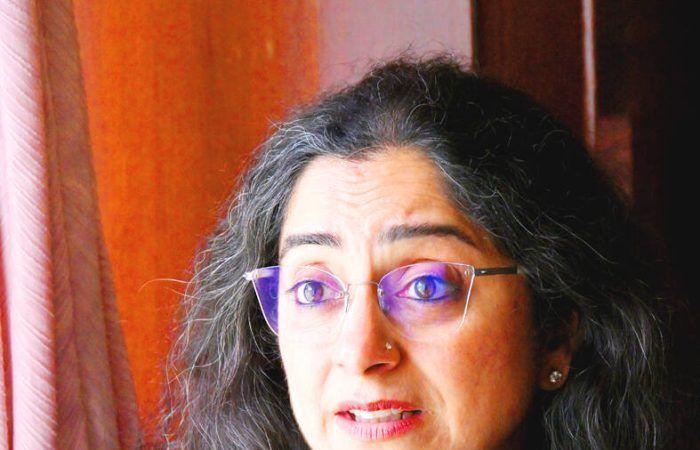MUTUALLY BENEFICIAL:
Taiwanese should travel to India and get a first-hand cultural experience to better understand the country, researcher Shamika Ravi said
-
By Liu Tzu-hsuan / Staff reporter
China should not be an obstacle for practical and mutually beneficial cooperation between India and Taiwan, former Brookings India director of research Shamika Ravi said in an interview with the Taipei Times and its sister paper, the Liberty Timesin Taipei on Thursday last week.
Taipei and New Delhi last month signed a memorandum of understanding (MOU) on Taiwan recruiting Indian workers and bilateral cooperation has been growing closer in fields such as education and semiconductor manufacturing.
Asked whether India is worried about the reaction from Beijing while it is seeking to increase cooperation with Taipei, Ravi said that Taiwan and India “need these kinds of collaborations to succeed, independent from any third country.”
Photo: Fang Pin-chao, Taipei Times
“We have to look over and beyond China in this case, because independent of them, I think this MOU is important for both of the nations,” she said.
India is not only forming a partnership with Taiwan and has similar MOUs with other countries, Ravi said. “We [India] are happy to work with anyone that will allow us to work in a way which is good for our people.”
Ravi made her first trip to the nation to attend the Taiwan-India Migrant Workers Conference, which was held on Thursday last week, to share her insights on women’s rights in India, which is her field of expertise.
It is “reassuring” to hear the presentation of the Ministry of Labor responding to the concerns from the media, academia and others, she said, adding that Taiwan and India are “keen to move ahead [with the MOU] and take it gradually.”
While the MOU allows India’s human capital to help Taiwan ease its labor shortage, Taiwan, as “an exceptional leader” in various technology products, could provide assistance to India as it is making huge investments in artificial intelligence and other areas, she said.
India sees its human resources as “a major asset” that would be highly beneficial to the industry and Taiwan’s economy, she said, adding that after talking to Taiwanese industry representatives, she believes that they feel the same.
Ravi said she was “a little surprised” to see negative reactions from Taiwanese about the MOU, as such reactions were rarely seen in other countries India signed similar agreements with.
However, the response is understandable, she said.
“Whenever an economy opens to people from outside, whatever the magnitude of that entry might be, there is some degree of apprehension” over decreases in job opportunities for local people and adaptation of migrant workers, she added.
The overall mood in New Delhi regarding the MOU is optimistic and “extremely happy” about its future prospects, she said.
India does not see Taiwan as a competitor but as an “important partner” in today’s globalized world where like-minded players seek to work together “because we have much to achieve,” Ravi said.
In addition to its investment in technology, India has a young population and skilled workforce that is complementary to Taiwan — a nation with an aging society, capital and technology, she said.
“Taiwan therefore becomes a very natural partner” for India to join hands with, she added.
On women’s rights, she said that election participation of Indian women has been much higher than among men in all elections and the number of women running in elections has increased 16 times in the past decade.
Indian women’s aspirations for political representation have made their needs unignorable by political parties, creating a “virtuous cycle in Indian democracy,” she said.
The percentage of female college graduates in science, technology, engineering and mathematics fields has risen to about 43 due to their will to learn rather than New Delhi’s preferential policies, she said.
Taiwanese should travel to India and get a first-hand understanding of the country, as there are stereotypes that even Indians have only just begun to realize, she said.
Comments will be moderated. Keep comments relevant to the article. Remarks containing abusive and obscene language, personal attacks of any kind or promotion will be removed and the user banned. Final decision will be at the discretion of the Taipei Times.
--





